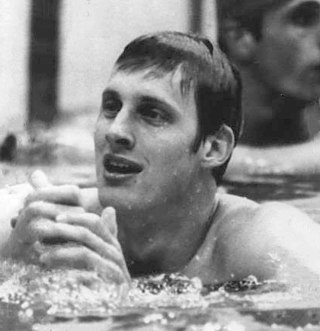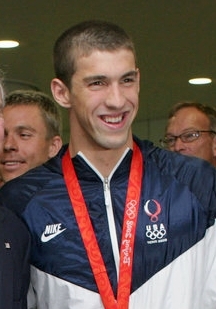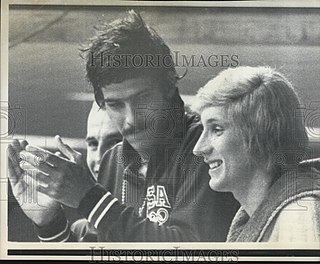
Swimming has been a sport at every modern Summer Olympics. It has been open to women since 1912. At the Olympics, swimming has the second-highest number of medal-contested events.

The men's 100 metre freestyle event at the 1976 Summer Olympics took place between July 24 and 25. This was the first time in history that the 100m freestyle was swum under 50 seconds. There were 41 competitors from 27 nations. Nations had been limited to three swimmers each since the 1924 Games. The event was won by Jim Montgomery of the United States, the nation's second consecutive and tenth overall victory in the men's 100 metre freestyle. His countryman Jack Babashoff took silver. Peter Nocke's bronze was the first medal for West Germany in the event, though the United Team of Germany had won a bronze in 1964.
The men's 400 metre freestyle was one of six swimming events on the swimming at the 1908 Summer Olympics programme. Its distance was the median of the 3 individual freestyle event distances. It was the first time an event over 400 metres was held at the Olympics. The competition was held from Monday July 13, 1908 to Thursday July 16, 1908.

The men's 200 metre freestyle event at the 2008 Olympic Games took place on 10–12 August at the Beijing National Aquatics Center in Beijing, China. There were 58 competitors from 50 nations. The winning margin was 1.89 seconds which as of 2023 remains the only time this race has been won by more than 1.8 seconds at the Olympics.

The men's 100 metre freestyle event at the 1952 Summer Olympics took place between 26 and 27 July at the Helsinki Swimming Stadium. There were 61 competitors from 33 nations. Nations had been limited to three swimmers each since the 1924 Games. The event was won by Clarke Scholes of the United States, the nation's second consecutive and seventh overall victory in the men's 100 metre freestyle. Japan, absent from the 1948 Games after World War II, returned to the podium in the event with Hiroshi Suzuki's silver. Göran Larsson earned Sweden's first medal in the event since 1908 with his bronze.
The women's 400 metre freestyle event at the 1956 Olympic Games took place between 5 and 7 December. This swimming event used freestyle swimming, which means that the method of the stroke is not regulated. Nearly all swimmers use the front crawl or a variant of that stroke. Because an Olympic size swimming pool is 50 metres long, this race consisted of eight lengths of the pool.

The men's 100 metre freestyle event at the 1964 Olympic Games took place between October 11 and 12. There were 66 competitors from 33 nations. Nations were again able to bring up to three swimmers each after a one-Games limit of two in 1960. The event was won by Don Schollander of the United States, the nation's first victory in the event since 1952 and eighth overall. Great Britain and the United Team of Germany both earned their first medal in the men's 100 metre freestyle.

The men's 100 metre freestyle event at the 1968 Olympic Games took place between 18 and 19 October. There were 64 competitors from 34 nations. Nations had been limited to three swimmers each since the 1924 Games. The event was won by Michael Wenden of Australia, the nation's third victory in four Games. Americans Ken Walsh and Mark Spitz took silver and bronze, respectively.
The men's 400 metre freestyle event at the 1968 Olympic Games took place between 22 and 23 October. This swimming event used freestyle swimming, which means that the method of the stroke is not regulated. Nearly all swimmers use the front crawl or a variant of that stroke. Because an Olympic-size swimming pool is 50 metres long, this race consisted of eight lengths of the pool.
The men's 1500 metre freestyle event at the 1968 Olympic Games took place between 25 and 26 October. This swimming event used freestyle swimming, which means that the method of the stroke is not regulated. Nearly all swimmers use the front crawl or a variant of that stroke. Because an Olympic-size swimming pool is 50 metres long, this race consisted of 30 lengths of the pool.
The women's 100 metre freestyle event at the 1968 Olympic Games took place between 18 and 19 October. This swimming event used freestyle swimming, which means that the method of the stroke is not regulated. Nearly all swimmers use the front crawl or a variant of that stroke. Because an Olympic-size swimming pool is 50 metres long, this race consisted of two lengths of the pool.
The inaugural women's 200 metre freestyle event at the 1968 Olympic Games took place between 21 and 22 October. This swimming event used freestyle swimming, which means that the method of the stroke is not regulated. Nearly all swimmers use the front crawl or a variant of that stroke. Because an Olympic size swimming pool is 50 metres long, this race consisted of four lengths of the pool.
The women's 400 metre freestyle event at the 1968 Olympic Games took place between 19 and 20 October. This swimming event used freestyle swimming, which means that the method of the stroke is not regulated. Nearly all swimmers use the front crawl or a variant of that stroke. Because an Olympic-size swimming pool is 50 metres long, this race consisted of eight lengths of the pool.
The women's 200 metre individual medley event at the 1968 Summer Olympics took place 20 October. This swimming event used medley swimming. Because an Olympic size swimming pool is 50 metres long, this race consisted of four lengths of the pool. The first length was swum using the butterfly stroke, the second with the backstroke, the third length in breaststroke, and the fourth freestyle. Unlike other events using freestyle, swimmers could not use butterfly, backstroke, or breaststroke for the freestyle leg; most swimmers use the front crawl in freestyle events anyway.
The women's 400 metre individual medley event at the 1968 Summer Olympics took place on 24–25 October. This swimming event used medley swimming. Because an Olympic size swimming pool is 50 metres long, this race consisted of eight lengths of the pool. The first two lengths were swum using the butterfly stroke, the second pair with the backstroke, the third pair of lengths in breaststroke, and the final two were freestyle. Unlike other events using freestyle, swimmers could not use butterfly, backstroke, or breaststroke for the freestyle leg; most swimmers use the front crawl in freestyle events.
The women's 4×100 metre medley relay event at the 1968 Olympic Games took place on 17 October. This swimming event uses medley swimming as a relay. Because an Olympic size swimming pool is 50 metres long, each of the four swimmers completed two lengths of the pool, each using a different stroke. The first on each team used the backstroke, the second used the breaststroke, the third used the butterfly stroke, and the final swimmer used freestyle.

The men's 100 metre freestyle event at the 1972 Olympic Games took place between September 2 and 3. There were 48 competitors from 29 nations. Nations had been limited to three swimmers each since the 1924 Games. The event was won by Mark Spitz of the United States, his then-record sixth gold medal in a single Games. It was the ninth victory in the event for an American, most of any nation. Jerry Heidenreich, also of the United States, took silver. Soviet swimmer Vladimir Bure earned bronze, the nation's first medal in the men's 100 metre freestyle.

The men's 200 metre freestyle event at the 1972 Summer Olympics took place on August 29 at the Olympia Schwimmhalle. There were 46 competitors from 27 nations, with each nation having up to three swimmers. The event was won by Mark Spitz of the United States, the nation's second victory in the event. It was the third gold medal for Spitz in 1972, halfway to his goal of six. His teammate Steve Genter took silver, with Werner Lampe of West Germany earning bronze. Defending champion Michael Wenden of Australia finished fourth.
The women's 800 metre freestyle event at the 1972 Olympic Games took place between September 2 and 3. This swimming event used freestyle swimming, which means that the method of the stroke is not regulated. Nearly all swimmers use the front crawl or a variant of that stroke. Because an Olympic size swimming pool is 50 metres long, this race consisted of sixteen lengths of the pool.

Kathleen Genevieve Ledecky is an American competitive swimmer. She has won seven Olympic gold medals and 21 world championship gold medals, the most in history for a female swimmer. She has won a world record 16 individual gold medals at the World Aquatics Championships. Ledecky's six individual gold medals at the Olympics and 26 overall medals at the World Aquatics Championships are records in women's swimming. Ledecky is the world record holder in the women's 800- and 1500-meter freestyle as well as the former world record holder in the women's 400-meter freestyle. She also holds the fastest-ever times in the women's 500-, 1000-, and 1650-yard freestyle events. She is widely regarded as the greatest female swimmer of all time and one of the greatest Olympians of all time.









